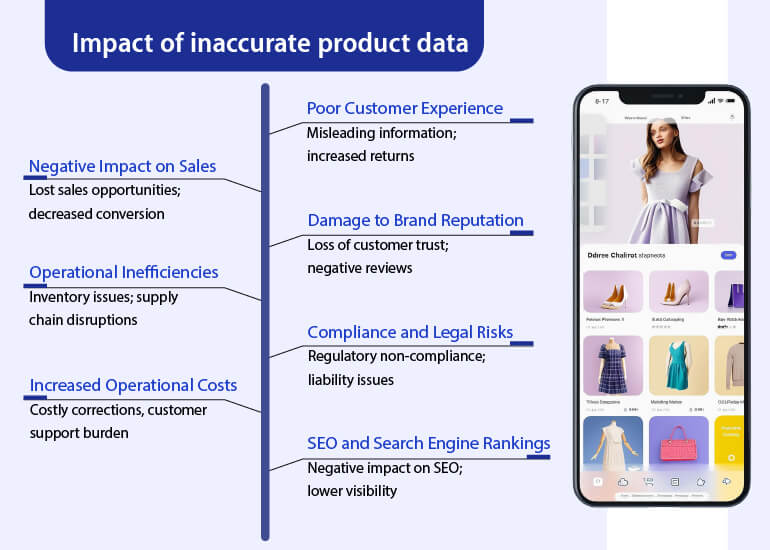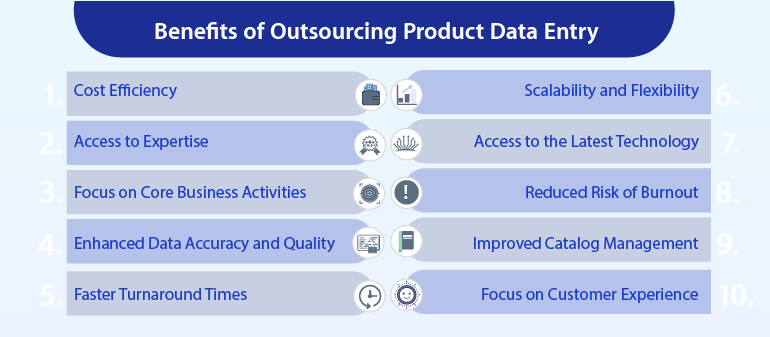8 Best Practices for Efficient Ecommerce Inventory Management
Accurate product data entry is crucial for eCommerce success, ensuring reliable product information, improved customer experience, and enhanced operational efficiency. By adopting best practices and leveraging technology, businesses can maintain data accuracy, leading to increased sales and customer satisfaction.
Online customers make purchasing decisions with a simple swipe, relying heavily on the product data presented. Accurate product data entry is crucial for a high-performing and engaging eCommerce catalog. Shoppers expect precise descriptions, clear images and detailed specifications to make informed choices. Even minor inaccuracies can lead to frustration, increased returns and a loss of trust.
Table of Contents
However, maintaining accurate product data in eCommerce catalogs is challenging due to frequent updates, inconsistent data sources, manual entry errors, and managing large amounts of information across multiple platforms.
This blog will explore essential strategies for ensuring data entry accuracy in your eCommerce catalogs. It will highlight the importance of accurate product data, the role of data validation, how automation enhances data entry efficiency and the benefits of outsourcing to professional data entry companies. Whether managing a small online store or a large platform, these insights will help you deliver a seamless shopping experience and strengthen your credibility.
Inaccurate product data in eCommerce can lead to severe consequences, affecting everything from customer experience to operational efficiency.
Here’s a visual representation of the key impacts:

To maintain a high-performing eCommerce catalog, ensuring the accuracy of your product data is non-negotiable. Here are the top 7 strategies that will help you achieve precise and reliable product data entry.
Maintaining accurate product data entry across all channels is crucial for any eCommerce catalog. A centralized platform like a Product Information Management (PIM) system can streamline this process by managing all product information in one place. This includes everything from descriptions and images to specifications, pricing and inventory, ensuring data consistency and accuracy.
Here’s how PIM enhances accuracy in product data entry:
To integrate PIM effectively, choose a system that seamlessly integrates with your platforms (e.g., Shopify, Magento). Utilize API connections for automated data transfers and make full use of tools like data validation and automated updates.
It’s important to conduct thorough testing, clean up existing data, and continuously monitor the system for optimization. Additionally, fostering cross-departmental collaboration will align goals and ensure the PIM system meets all teams’ needs, resulting in smoother adoption and maximum effectiveness.
Quality ecommerce product data entry to boost your business’s growth.
Ensuring the accuracy and completeness of product data is important for maintaining a reliable eCommerce catalog. Data validation and enrichment tools play a vital role in this process by identifying and correcting errors, filling in missing information and enhancing the overall quality of your data. These tools ensure that your product information is both accurate and comprehensive.
Key benefits of using data validation and enrichment tools include:
To utilize these tools effectively, integrate them into your PIM system or eCommerce platform. Configure them to automatically validate and enrich data upon entry and conduct periodic reviews for ongoing accuracy. Implement validation scripts or third-party tools for real-time data integrity checks during entry. Regular audits and updates will ensure high data quality, resulting in a reliable and engaging eCommerce catalog.
Efficient management of large product catalogs is crucial for maintaining accurate data on your eCommerce platform. Bulk data import and export features significantly reduce the time spent on manual data entry and minimize the risk of human error. These capabilities are especially valuable when onboarding new products or updating extensive catalogs, ensuring data consistency and accuracy.
Here’s how bulk import/export enhances accuracy in product data entry:
To effectively leverage bulk data import/export, use formats like CSV, XML or JSON, which are widely supported by eCommerce platforms. Ensure your platform supports bulk operations with data-mapping features to correctly align fields during the import/export process.
For example, tools like Shopify Bulk Editor and Magento Import/Export Tool facilitate bulk data management, supporting CSV and XML formats for seamless integration. Incorporating these features into your workflow not only enhances data accuracy but also improves efficiency, allowing you to manage your product catalog more effectively.
Read also: 8 Proven Photo Editing Best Practices for Powerful Catalogs
Accurate product data entry is crucial for maintaining a reliable eCommerce catalog, and real-time synchronization of inventory and pricing data is a key component of this accuracy. Ensuring that your inventory levels and pricing are always up to date across all sales channels prevents overselling, stockouts and pricing discrepancies, which directly contributes to a seamless shopping experience and enhances customer satisfaction.
Here’s how real-time sync supports accurate product data entry:
To achieve accurate product data entry with real-time sync, use APIs or third-party connectors that link your eCommerce platform with inventory management systems. Tools like TradeGecko (now QuickBooks Commerce) and Channel Advisor enable seamless synchronization across multiple sales channels, including major marketplaces. Regularly test the synchronization process to ensure all updates are accurately reflected, helping to maintain a reliable and engaging eCommerce catalog.
Accurate product data entry is not a one-time task; it requires ongoing attention to ensure your eCommerce catalog remains reliable. Periodic audits are crucial for uncovering and correcting discrepancies, outdated information, and inconsistencies. Regular optimization ensures that your product data stay relevant and accurate over time, enhancing customer satisfaction and operational efficiency.
Here’s how regular audits and optimization support accurate product data entry:
To effectively audit and optimize your data, use audit scripts or third-party tools to check regularly for inconsistencies in product descriptions, images and pricing. Implement version control to track changes and roll back, if necessary. Tools like Plytix, with built-in analytics, can help audit and optimize your product data, while Google Data Studio can create reports and dashboards for ongoing performance tracking. By consistently auditing and optimizing your data, you’ll maintain a high standard of accuracy, ensuring your eCommerce catalog performs at its best.
Managing large volumes of product data or handling specialized data entry tasks can be challenging for any eCommerce business. Outsourcing these complex tasks to experts ensures high accuracy and efficiency while allowing your internal team to focus on core business activities. This approach not only maintains data quality, but also optimizes your resources.
Here’s how outsourcing supports accurate product data entry:
When outsourcing, choose a partner with experience in your specific eCommerce platform and industry. Ensure they use secure, encrypted connections for data transfer and implement rigorous quality control processes. Regular communication and ongoing quality checks are essential to maintaining high standards.
Tools and processes such as data validation, enrichment and real-time updates should be part of their offering. By outsourcing complex data entry tasks, you can ensure your product data remains accurate, up-to-date, and efficiently managed, contributing to a reliable and high-performing eCommerce catalog.
Accurate product data entry is essential for a successful eCommerce catalog, and AI and machine learning can significantly enhance this accuracy by automating the classification and tagging of products. These technologies ensure that items are correctly categorized, making them easily searchable and improving the overall organization of your catalog. This is especially beneficial for large, diverse product catalogs, where manual classification would be both time-consuming and prone to errors.
Here’s how AI and machine learning support accurate product data entry:
To effectively use AI and machine learning for accurate data classification, integrate AI-driven tools that seamlessly connect with your eCommerce platform. These tools can automatically categorize products based on attributes such as type, color and size, ensuring consistent data entry.
Consider tools like Clarifai for AI-driven product classification or Amazon Rekognition, which uses machine learning to identify and categorize products. Regularly updating and training these models will help maintain the highest level of accuracy in your product data entry, contributing to a well-organized and efficient eCommerce catalog.
Accurate product data entry ensures that every aspect of your product information is correct and up-to-date. Here’s how accurate data benefits your eCommerce Catalog.

Maintaining accurate product data in eCommerce catalogs is filled with challenges, from managing large volumes of data to ensuring consistency across multiple channels. Here’s an overview of the key obstacles you may encounter:
Outsourcing product data entry for your eCommerce catalog offers numerous benefits. Accurate catalog management not only streamlines operations, but also significantly improves brand recall and customer experience.
For instance, accurate catalog management for Powersports Superstore boosted its brand recognition and customer satisfaction.

Ensuring data entry accuracy is crucial for maintaining the integrity of your eCommerce catalog. By following these catalog management best practices, you can not only achieve consistent and reliable data but also enhance your overall online catalog management.
Accurate product data entry is the foundation of a successful eCommerce catalog. It directly impacts customer satisfaction, searchability and overall operational efficiency. By implementing strategies such as integrating a PIM system, utilizing data validation tools, leveraging AI for data classification, and regularly auditing your data, you can maintain high standards of accuracy.
Additionally, outsourcing complex tasks and training your team on best practices ensures that your product data remain consistent and reliable. Outsourcing provides an additional advantage as experts utilize advanced data capture technologies to ensure greater accuracy and efficiency in managing your product data.
These efforts not only enhance the shopping experience, but also boost conversion rates, reduce errors, and strengthen your brand’s credibility.
What’s next? Message us a brief description of your project.
Our experts will review and get back to you within one business day with free consultation for successful implementation.
Disclaimer:
HitechDigital Solutions LLP and Hitech BPO will never ask for money or commission to offer jobs or projects. In the event you are contacted by any person with job offer in our companies, please reach out to us at info@hitechbpo.com
Leave a Reply